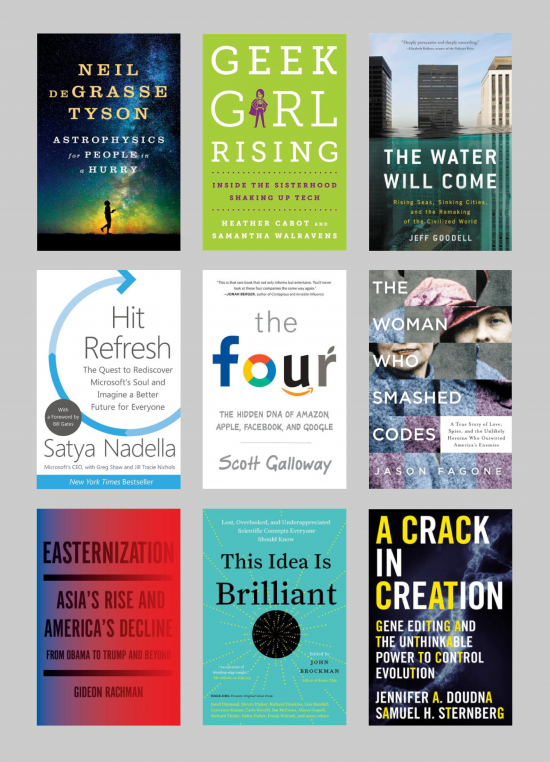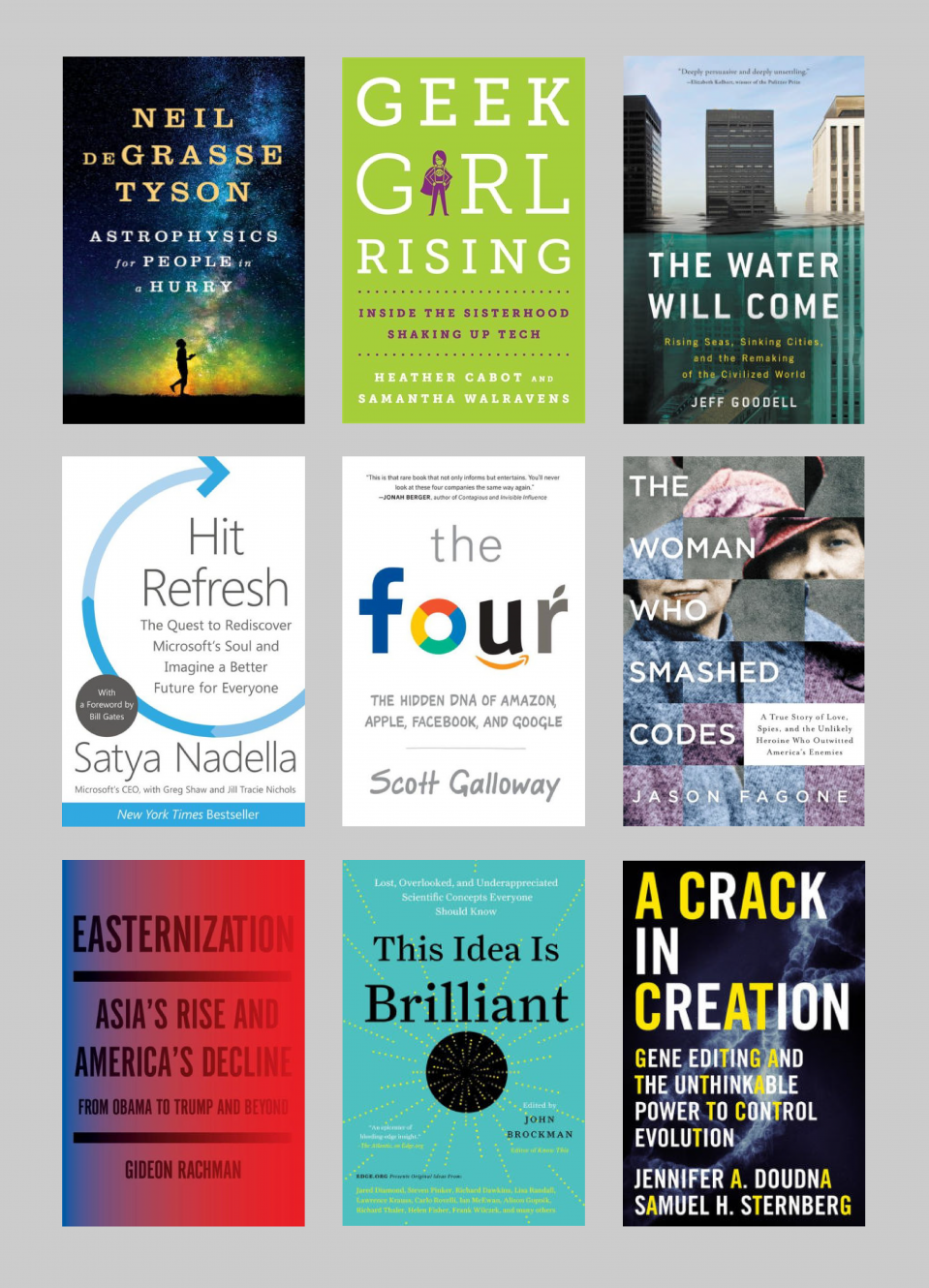Connectivity
Best Tech Books of 2017
Our editors’ picks for the best books of 2017, and some they’re looking forward to.



By Samantha Walravens and Heather Cabot
Through personal stories, Cabot and Walravens shine a light on the women making waves in the technology industry. While the diversity statistics often show a grim image of women’s experience in technology and entrepreneurship, Geek Girl Rising paints a brighter picture of the women who are rallying to start companies, investing in each other, and pulling up those coming behind them. The book features entrepreneurs such as Debbie Sterling, founder and CEO of toy company GoldieBlox, and Joanne Wilson, owner of Gotham Girl Ventures.
–Erin Winick
By Jeff Goodell
Rolling Stone climate writer Jeff Goodell’s new book takes the reader on a world tour of tragedy, unfolding just slowly enough that we’ve done very little about it. In a series of portraits from sinking islands and cities around the globe, he successfully underscores the immense dangers of sea-level rise, the scale of the looming costs, and the utter inadequacy of our responses to date. It’s a call to action for coastal cities and states to undertake smart, dedicated, and sustained efforts to reinforce their shores. But it’s also an honest appraisal making clear that for many places, whether it’s ever an active policy decision or not, the only realistic option will be retreat.
–James Temple
By Satya Nadella, with Greg Shaw and Jill Tracie Nichols
When, in 2014, Satya Nadella became only the third CEO in Microsoft’s 40-year history, the company was in a funk. It had missed the boat on mobile computing, and morale was sinking fast. Hit Refresh recounts how Nadella has revamped its culture, revived its fortunes, and accelerated its push into emerging technologies such as artificial intelligence, mixed reality, and quantum computing. The narrative is of course self-serving, but Nadella’s genuine passion for people and technology stands out. So, too, does his thoughtful approach to the societal impact of innovations. The most productive debate to have about AI, he says, isn’t one that pits good against evil but, rather, one that examines the values of the people and institutions building the technology. That’s a refreshing take on a vitally important and increasingly polarized discussion.
–Martin Giles
By Scott Galloway
Back in the 1990s, Microsoft ruled the technology world. Now the mantle has passed to the four companies that are the subject of Scott Galloway’s book. Its author, who’s both a professor at New York University and an entrepreneur, has had firsthand experience of competing with “the great white shark of retail,” which has clearly informed his astute analysis of Amazon’s rise. After dissecting the influence of the other tech giants, he argues that we need to think very differently about careers and education in a world where they’re upending industry after industry. Galloway also asks how society should manage a small group of businesses that wield such unprecedented power. Sadly, he doesn’t have a compelling answer, except to hope that the ferocious rivalry between them helps keep them in check.
–Martin Giles
By John Brockman
This Idea Is Brilliant stands out by identifying dozens of scientific concepts that deserve more attention, selected with input from leading thinkers such as the evolutionary biologist Richard Dawkins and the technology writer Nicholas Carr. It’s the latest creation of Edge.org, a website that draws attention to ideas on “the frontiers of knowledge in the areas of evolutionary biology, genetics, computer science, neurophysiology, psychology, and physics” and has published other (best-selling) books using a similar expert-crowdsourced model.
–Elizabeth Woyke
By Jennifer Doudna and Samuel Sternberg
In 2012, Jennifer Doudna, a biologist at the University of California, Berkeley, coauthored a seminal paper that described how CRISPR-Cas9, a natural defense system found in bacteria, could be used as a powerful genome-editing tool. In the years since, CRISPR has been imagined as a way to cure devastating genetic diseases by snipping out faulty DNA or adding healthy copies of genes. But many worry that CRISPR will enable genetic engineering of “designer babies” with certain desirable traits. Co-written with her former graduate student Samuel Sternberg, Doudna’s book explores what it means to be at the forefront of a cutting-edge technology and addresses the implications that come with the ability to change not only our own DNA but also the life around us.
–Emily Mullin
By Gideon Rachman
I read this book while researching a feature on the rise of AI in China. Written by the chief foreign affairs commentator for the Financial Times, it offers a broad and detailed perspective on China’s economic and political rise, and the implications for relations with the West. The book also reveals—sometimes inadvertently—how this rise is perceived by politicians, especially here in the U.S. Rachman doesn’t go into technology too much, but it isn’t difficult to see how China’s growing expertise, and the global ambitions of its tech companies, fit into the picture.
–Will Knight
By Neil deGrasse Tyson
Clocking in at under 300 pages, Astrophysics for People in a Hurry really is a speedy trip through the cosmos. Tyson crams in plenty—from dark matter to the Big Bang to how the general theory of relativity helped us understand the universe—in accessible language for even the most earthbound among us.
–Jackie Snow
By Jason Fagone
This is the best work of nonfiction I’ve ever read—no hyperbole. Fagone’s masterfully researched and crafted narrative re-creates the story of Elizebeth Smith Friedman, one of the preeminent codebreakers in American history. She worked as a cryptanalyst for the U.S. government during World War I, quickly rising through the ranks and establishing herself as a brilliant mind in the field, and then moving on to continue this work during World War II. She led the charge to break up the Nazi spy rings in South America and contributed hugely to allied efforts to break codes from the famous Nazi Enigma machine that Alan Turing is most often credited with cracking. Intertwined with this riveting and suspenseful true tale is the story of her relationship with her husband, William Friedman, also a pioneering codebreaker and one of Elizebeth’s closest confidants and intellectual partners. Love letters the pair wrote each other (in code, of course) are sprinkled throughout the book. Unfortunately, while William went on to be considered one of the fathers of modern American surveillance—his work contributing greatly to the founding of the National Security Agency (much to his chagrin)—Elizebeth was almost entirely, and systematically, erased from history by the efforts of J. Edgar Hoover, who reclassified several decades’ worth of work under new initials, making the achievements difficult to trace back to her. Fagone has painstakingly worked backward to piece together a truth that has been buried for too long. In the process, he has helped Friedman gain recognition as the American hero she was. This book will be especially enjoyed by those who lapped up stories like Hidden Figures or The Radium Girls.
–Julia Sklar